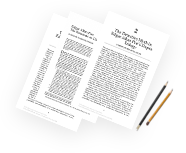1. Defence budgets comprise a significant proportion of national wealth, while decision-making in defence has profound implications for the lives of citizens in the country concerned, as well as people at the receiving end of military operations. Military power also forms a central dimension of states’ power and influence in the international system. However, the post-Cold War era has witnessed significant variation in the extent to which states’ defence reforms have delivered a strategic advantage, with a number of cases of inappropriate or faulty military innovation and/or emulation. Analyses the content and sources of change in defence policy during the post-Cold War era. It will focus on changes to the objectives of defence policy, military procurement, force structures and doctrines of the world’s major military powers, including Britain, China, Germany, and the US. In doing so, it will analyse the extent to which these reforms have helped the state concerned to meet its central security challenges. The course will be informed by the insights of political science and IR approaches to the sources of military change. These approaches include neorealism, neoclassical realism, bureaucratic politics, organisation theory, strategic culture, organisational culture and public policy approaches. In its examination of the sources of military change, also looks at the factors which facilitate effective learning and adaptation within military organisations.
2. Dyson, T. (2010) ‘Competing Theoretical Frameworks’ in Dyson, T. Neoclassical Realism and Defence Reform in post-Cold War Europe (Basingstoke: Palgrave), pp. 93-133. (Uploaded Pages) Additional readings: Farrell, T (1998) ‘Culture and Military Power’, Review of International Studies 24, no.3, pp. 407-16. Posen, B. R. (1984) The Sources of Military Doctrine: France, Britain and Germany between the World Wars. (Cornell: Cornell University Press). Rosen, S. (1998) ‘New Ways of War: Understanding Military Innovation’ International Security (Summer), pp.134-68.
3. Lecture-2, Theorising, Lecture-3 US defence and Lecture-4 UK defence Uploaded. 4. Please focus on Constructivism. Can see Imperial thyme, Military Doctrine for two countries or One country. We could focus on UK or Germany. How the US thinking about defence and what other powerful countries
#Analyse #utility #Constructivism #explaining #Military #change




